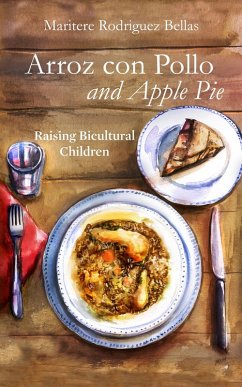
A Mirror of Times (eBook, ePUB)

PAYBACK Punkte
4 °P sammeln!
Alejandro Paredes was born in Matagalpa, Nicaragua. In 1970, he moved to Los Angeles, California, where he stayed for almost fifty years. He earned a degree in Bilingual Education from California State University. Later, he completed his postgraduate studies at the University of Southern California, earning a master's and a doctorate in literature and applied linguistics. After working as a teacher for several years, he joined one of the most prestigious publishing houses in the United States, focusing on editing and writing educational materials for bilingual education and language learning. ...
Alejandro Paredes was born in Matagalpa, Nicaragua. In 1970, he moved to Los Angeles, California, where he stayed for almost fifty years. He earned a degree in Bilingual Education from California State University. Later, he completed his postgraduate studies at the University of Southern California, earning a master's and a doctorate in literature and applied linguistics. After working as a teacher for several years, he joined one of the most prestigious publishing houses in the United States, focusing on editing and writing educational materials for bilingual education and language learning. He now lives in Washington state.
A Mirror of Times is a story about the life of a middle-class family and the ongoing struggles of its strong, resilient women against prevailing and dominant sexism. In the late 19th century in Matagalpa, Nicaragua, Maria Adela Arana, a daughter from a devout and respected Catholic household, started a new family branch, the Arana-Parodi lineage. At that time, Matagalpa was a remote frontier town near tropical forests and nearly impassable mountains, isolated from the major cities on the Pacific coast. However, it soon transformed into a respectable agricultural area with great potential. Between the ages of sixteen and twenty-eight, Maria Adela gives birth to four children-two daughters and two sons. From these roots, a large family grows, experiencing ups and downs similar to the city's growth, eventually becoming a key urban center in the 20th century. While one side of the family achieves economic success, the rest struggle with poverty and social scandals that keep them on the brink of acceptance and rejection by their strictly traditional community.
A Mirror of Times is a story about the life of a middle-class family and the ongoing struggles of its strong, resilient women against prevailing and dominant sexism. In the late 19th century in Matagalpa, Nicaragua, Maria Adela Arana, a daughter from a devout and respected Catholic household, started a new family branch, the Arana-Parodi lineage. At that time, Matagalpa was a remote frontier town near tropical forests and nearly impassable mountains, isolated from the major cities on the Pacific coast. However, it soon transformed into a respectable agricultural area with great potential. Between the ages of sixteen and twenty-eight, Maria Adela gives birth to four children-two daughters and two sons. From these roots, a large family grows, experiencing ups and downs similar to the city's growth, eventually becoming a key urban center in the 20th century. While one side of the family achieves economic success, the rest struggle with poverty and social scandals that keep them on the brink of acceptance and rejection by their strictly traditional community.
Dieser Download kann aus rechtlichen Gründen nur mit Rechnungsadresse in A, D ausgeliefert werden.













